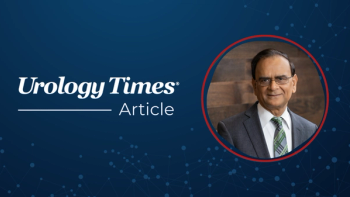
Low free testosterone linked with ED in post-RP males
A recent study found low levels of free testosterone in older men with prostate cancer could increase these men’s odds of facing erectile dysfunction after undergoing radical prostatectomy.
Chicago-A recent study found low levels of free testosterone in older men with prostate cancer could increase these men’s odds of facing erectile dysfunction after undergoing radical prostatectomy.
The study, presented at the AUA annual meeting in Chicago, indicated low levels of free testosterone have a negative effect on erectile function in men older than 60 years of age who have prostate cancer-and the effect worsens with age, researchers from the department of urology at the University of California Irvine found.
As a result, the authors recommend obtaining free testosterone levels in all men over the age of 60 years who are preparing to undergo radical prostatectomy. These levels could be used to predict recovery of sexual function after surgery.
In fact, “Maybe we should be treating free testosterone even if there are no symptoms now, because there could be symptoms of erectile dysfunction later,” Maxwell Towe, BS, a clinical research fellow at University of California Irvine, told Urology Times.
Also see:
Testosterone deficiency is associated with significant health problems in adult men, including obesity, diabetes, and hypertension. Low levels of total testosterone are one of the diagnostic criteria for hypogonadism. However, current clinical guidelines do not account for the impact of free testosterone levels on sexual dysfunction, even though levels of free testosterone are known to decrease as men age, while the prevalence of hypogonadism increases with age as well.
With this in mind, the authors sought to understand the relationships between free testosterone and sexual function in middle-aged-to-older men with prostate cancer.
The authors studied 820 men who underwent robot-assisted radical prostatectomy for primary treatment of localized prostate cancer. Preoperative evaluations included assessment of sexual function through International Index of Erectile Function (IIEF-5) scores and measurement of baseline sex hormone levels, including total testosterone, sex-hormone binding globulin, and free testosterone. The authors also studied the impact of age, body mass index, and pathologic grade on sexual function.
The men were then separated into two cohorts: those between the ages of 40 and 60 years (35.4% of patients) and those 60-80 years of age (64.6%).
Next:
The results revealed mean free testosterone levels were significantly higher in men younger than 60 years of age (6.74±4.24 ng/dL) versus their older counterparts (5.6±2.52 ng/dL). Multivariate analyses showed free testosterone levels are an independent predictor of sexual function in men older than 60 years, but not in younger men. Similarly, body mass index is an independent predictor of sexual function in older men, but does not have a significant correlation with sexual function in younger men. Meanwhile, age is an independent predictor of sexual function in both cohorts, the authors found.
Read -
Furthermore, men in the older cohort reported worse erectile function at a predetermined low free testosterone level compared with younger men. Only 30% of men ages 60-80 years reported an IIEF-5 score between 22 and 25 with a calculated free testosterone level below the 25th percentile (<4.42). In men 40-60 years of age, however, 65% reported IIEF-5 scores between 22 and 25 when their free testosterone level fell below this cutoff.
“I was surprised by the lack of correlation between low levels of free testosterone in younger men and erectile dysfunction. It could be because androgen levels decrease with age. Or, young men could be heartier,” said Towe, who worked on the study with Thomas Ahlering, MD, and colleagues.
Contact us! Email comments and article ideas to
Newsletter
Stay current with the latest urology news and practice-changing insights — sign up now for the essential updates every urologist needs.






